Items
topic_interest is exactly
Covid-19
-
 2024-05-10
2024-05-10Two weeks turns into months
Hearing of this so-called COVID-19 virus towards the beginning of my junior year of High School sounded a little suspicious. It was as if I was watching a movie about an apocalypse. Where everyone rushes to the supermarkets and grabs everything they can. Disinfecting every item as we bring it back into our house. Making sure we wear masks. The news of hearing that two weeks off of school to any student sounds amazing. Although I didn't expect it to turn into months. Not being able to see any of my friends or teachers. Learning everything online has changed the way schools teach to this day. It went from "Yes two weeks off" to "Where did time go?". As time passed going back into school was an adjustment as well. Only kids with the same starting last names had to go to school one day while the other half had to another day. Still, wearing masks doing COVID check-ups before entering the school as well as even checking our temperature as we walk in. Overall looking back I've noticed how hard Covid hit globally. People had to isolate for long periods of time, making sure family members and friends were okay. It was overall a tough time, but we can take a lot from this pandemic to use in future uses. -
2024-05-09
COVID 19 zero contact
The pandemic was the worst for me to be honest because I couldn't take a class that was designed for on campus. Because of that, I had to drop the class and wait for campus classes to be available so I could learn better in the classroom settings. I was depressed because it was my first time dropping a class since I started college in spring 2018. I had to wait for the next semester to retake the class which held me back a semester . I'm happy I got out of that stage which took me a while to get out of. I had to go to work regardless of what was happening in the pandemic because I was working in a retail store at the time and wasn't allowed to stay home like other people. Until you have COVID and you submit your doctor's note to get two weeks off. The new rules that were made for the retail stores cause people to fight because of a cough or a sneeze was just overall depressing. The news was very depressing because older people in the nursing home could see their loved ones before they die or hug them for the last time. Nurses couldn't go home to their family because they had to work long hours and they did not want to carry any disease home to their loved ones. 2020 was No bonding time at this moment. -
2020-12-20
Declaring Patient 100 Deceased Life as a NYC EMT During an Unprecedented Global Pandemic
December 20th, 2020, started as an “ordinary” day for myself and my colleagues. 1600 hours rolled around, and my partner and I clocked in for our sixteen-hour tour. We had finally adjusted to our new routine of working a mandatory sixteen hours as opposed to twelve. As emergency medical technicians, we were at the forefront of the COVID-19 Pandemic in New York City. Our region was hit hard by COVID-19 and seemed to be the epicenter of the pandemic for longer than one could ever imagine. For NYC EMS workers before the pandemic, it was common to see around three thousand calls for service daily across all five boroughs. Once the pandemic struck the call volume rapidly overwhelmed the city's EMS resources as they answered a record seven thousand calls for service daily. My partner and I made small talk as we awaited the arrival of the outgoing crew. The day shift arrived back at the station exhausted, defeated, and depressed. They informed us that during their sixteen-hour tour, they had answered twenty calls for service; fifteen of which were for critically ill patients. After some small talk, we exchanged medication kits and radios as it was our turn to serve the great city. Immediately after logging on to the computer system and giving the dispatch center an in-service signal, we were called for a priority one assignment. Our unit was called to the scene of a thirty-two-year-old mother diagnosed with COVID-19 who had stopped breathing. As we arrived at the scene, I donned my four-day-old n95 mask, as well as a makeshift gown made from a garbage bag with holes cut for my head and arms. As we made our way up the five flights of stairs the sound of the screams grew louder. We entered the apartment to find a woman lying on the couch who was clinically deceased. For the next forty-five minutes, my partner and I worked feverishly to perform cardiopulmonary resuscitation, defibrillation, endotracheal intubation, as well as intravenous cardiac drug administration. Despite our efforts, the patient continued to show no signs of life, my partner and I locked eyes and nodded at one another, knowing we had done all that we possibly could have for this patient. I switched the cardiac monitor off and looked down at my watch as I said, “Time of death 1705 hours”. Our next responsibility was to inform the patient’s husband and children of her passing. While you train for many hours to show empathy after death, this task never gets easier. My partner sat in the kitchen with the family, while I prepared the paperwork for a death pronouncement. My partner delivered the life-shattering news and did her best to console a grieving family. After returning to our ambulance to decontaminate our equipment and restock for the next assignment I opened my logbook to record the death encounter. My heart sank as I turned to the next open page which was page number one hundred. In less than one year, I had pronounced one hundred patients deceased from COVID-related illnesses. In my short career before the pandemic, I had only pronounced about fifteen patients deceased. It was at that moment that the true magnitude of the pandemic sank in. COVID-19 had decimated the way of New York City life, the previously bustling city remained shuttered as many remained in indoors in hopes of preventing illness. Before the pandemic, I had known the city as a connection of vibrant neighborhoods filled with culture and joy. COVID-19 had robbed our great city of its life and color; for the next two years, the city appeared black and white as a shell of its previous greatness. These thoughts quickly fled my mind as my unit was once again called to another high-priority assignment. We were called to a sixteen-year-old man diagnosed with asthma, who had recently contracted COVID-19 and was struggling to breathe. Our days were filled with assignments like these, often with no rest, and zero opportunities for a meal break. Nearly one year into the COVID-19 pandemic, my colleagues and I were exhausted, and our mental health and morale were at an all-time low. Many of my collogues fell ill, and four of them died because of COVID-19. We had often asked ourselves and one another; “Why Us? Why are we still doing this job? and when will this end?” While these times were challenging, we understood that we had been called to work in EMS because of our passion for caring for those in need. Day in and day out, we found strength and resilience in one another. My colleagues and I had implemented daily peer support groups in which all were welcome to come and speak about their experiences. While COVID-19 seemed to pull the world apart, it pulled EMS staff closer together. Enemies quickly became friends, and seemingly overnight we all became family. Our perspectives were unique as we were the only healthcare providers to enter the homes of the ill, and feverishly worked to care for them under less-than-ideal conditions. As the number of COVID-19 cases began to decline with the introduction of the vaccine, my colleagues and I felt we could breathe a sigh of relief. As quickly as the pandemic entered our great city, it seemed to vanish even faster. Each shift brought hope as we watched businesses reopen, and the streets were once again filled with color and culture. While we experienced new variants and spikes in COVID-19 cases, we felt that our great city had become stronger and more resilient. While COVID has changed our way of life, one thing I will never forget is the comradery we built amongst the emergency medical services personnel. To this day my colleagues remain a second family in which I can confide after a difficult shift. While COVID was one of the greatest challenges faced by New York City, I feel that it has made us stronger and more resilient than ever. -
0012-03-20
The Day the World Changed
On March 12th, 2020, I found out the fate of the remainder of my first spring semester as a college student. I don’t remember much about days during quarantine, but I do remember specific details of this day. It was the week before Spring Break for UAB, and all students were preparing for a week off from school. That weekend, my family was planning a trip to New Orleans for the weekend as my mother’s employer offered her a free two-night stay at any hotel of her choosing. My dad and I were planning to finally visit the National World War Two Museum. As my friend and I were walking to dinner at a local poke place in Five Points South, I received my first email that my English class would remain virtual for the remainder of the semester. My professor had Type 1 Diabetes and did not want to risk his health. Shortly after, the entire student body of UAB received an email that students would not return to campus until April 1st, 2020, at the earliest. While some students decided to pack up all of their belongings and take them home with them, others truly believed we would be coming back on April 1st. I decided not to take my belongings with me and traveled four hours to my hometown for the extended break. I went home that Friday, March 13th, 2020, after taking my midterm for Biological Anthropology. Once I arrived home, my parents made the decision to cancel our trip as the spread of COVID-19 was unknown at this time, and they did not want to risk going to a public and crowded place like New Orleans. Instead, my father and I traveled four hours back to Birmingham to pack up my dorm room and bring my belongings home. At this time UAB had completely shut down and was limiting access to campus and the dorms. They only allowed me 15 minutes to get any belongings needed. After that trip, UAB officially closed for the remainder of the term and students belongings were moved out of the dorms by moving companies to make room for healthcare workers. We did not get the chance to go on our New Orleans trip until over two years later, in 2022. I planned a big trip for my 21st birthday with my friends and family. While most restrictions have been lifted, people were still wearing masks, and businesses were still enforcing the three- to six-foot social distancing. I wasn’t surprised, as just earlier in the year, my employer required face masks for the spike in COVID cases in Birmingham. I remember going to restaurants and we were required to wait outside for our table. In the National World War Two museum, there were stickers on the floor that represented how far we should stand from each other. While many of the restrictions, including the social distancing and wearing a mask, had been lifted, it was nice to see that people were still making it a point to follow them for the safety of themselves and others. -
2021-03-11
Missouri Travels A Year After COVID
In 2020, the COVID-19 pandemic shut everything down, and the world went into a global lock down. A year later, restrictions started being lifted and my mother and I traveled to Osage Beach Missouri, as well as the surrounding areas. Because Osage Beach was a tourist town on a lake most of the local attractions were closed due to it being the off season. It was March of 2021. Previously, my family had loved going to Missouri, but always had gone to Branson. We chose Osage Beach, however, because we could get free accommodations through my parents timeshare points. The day I remember most of the trip was traveling to St. Louis, Missouri to visit the St. Louis Zoo. The day before going we had to book a time slot in order to reduce our chances of being exposed to COVID and in order for the zoo to know approximately how many people were there. We did not have to wear medical masks outdoors, since we were fully vaccinated, but when in areas like the gift shop or some dining facilities we had to wear masks. If a zoo worker asked to see our COVID vaccine cards we had to show them or put on masks. After visiting the zoo, my mom and I went to a local pizza pub in Osage Beach that had St. Louis style pizzas. They were not as concerned about the COVID regulations and did not enforce any mask or social distancing policies that the St. Louis Zoo had. This was a theme of Missouri restrictions as I saw when I toured the Missouri State Penitentiary in Jefferson City. There I was not required to wear a mask or social distance, but group numbers were limited and reservations had to be made. Luckily my mother and I did not get COVID during the trip, but after a year of lock down and restrictions, the few restrictions still in place felt like a culture shock, even though I still lived in Texas at the time. -
2022-02-26
My Personal Experience with COVID-19
It was Christmas of 2020, and my eighty-four-year-old Dad was really sick. Up until then he had been healthy. He worked out at the gym every day and always went for coffee at Starbucks afterwards. I call him every day, and I could tell he was under the weather, but he didn’t want to admit he had COVID-19. He was sick for several weeks but came over on Christmas Eve to have dinner with our family. I remember being slightly irritated that he did come over because we could have brought him dinner at his house and minimized exposure to everyone else. Fortunately, our family and my sister’s family did not catch it that year. Oddly enough, we wouldn’t catch it until the following year. I remember being sort of surprised that we didn’t catch it because everyone around us had it. When the gyms and restaurants and grocery stores all closed, I would walk around our subdivision everyday to continue my exercise routine and I noticed I was tired and had shortness of breath. I remember going in for my annual physical with a face mask on and telling my doctor my symptoms. I remember him saying that those symptoms were too early to be COVID-19 and was probably a milder version of the flu. I was doubtful due to being heavily exposed by my dad, as well as so many others who had no idea they had it but were technically “super-spreaders.” My sister’s family and our family caught Covid within a week or two of each other despite not having any contact and being vaccinated the prior year. My husband and I both opted for the Johnson& Johnson vaccination because it was traditional with just the one shot. Our friend, who worked with my husband also got the same vaccination. My husband and I were sick after the shot, but we knew from friends that we would be. It lasted maybe a night and then we felt better the next day. Our friend wound up in the hospital after her vaccination with a small intestinal blockage which she blamed on the shot. She stayed in the hospital for about a week, but other than some follow-up monitoring, she is ok. Shortly after that, we read in the news that several women had died from embolisms after receiving the vaccination. Our daughter, who has special needs, sees many doctors and I remember telling him that I just gotten vaccinated and now there was this complication. He was very reassuring and said that the women who had passed away probably had a serious and pre-existing condition. He told me to stay active for the next week or two and drink lots of water which I did, but it was the longest two weeks until we were cleared from the risk. We did end up catching Covid in February-March 2022. It had been a normal week. I went to the store, gym, did carpool, walked the greenway, but I felt slightly off all week long. I remember coming home and making dinner, but I was exhausted and told my husband that I was unable to have dinner with everyone that evening. Sure enough, I was running a low fever. I took an at-home COVID test, and my results showed I was positive within a few seconds. I immediately quarantined in our bedroom for the next several days. My husband caught it about a week later, but his symptoms were different than mine. He had a bad sore throat and was cold and shivering for a couple of days, and had a cough that lingered. Our daughter, who has severe Cerebral Palsy, caught it next but thankfully she only had mild symptoms for two days and recovered almost immediately. Our son caught it last, and he had a very bad sore throat for a week. We made it through, and consider ourselves fortunate that we recovered without long-term issues. -
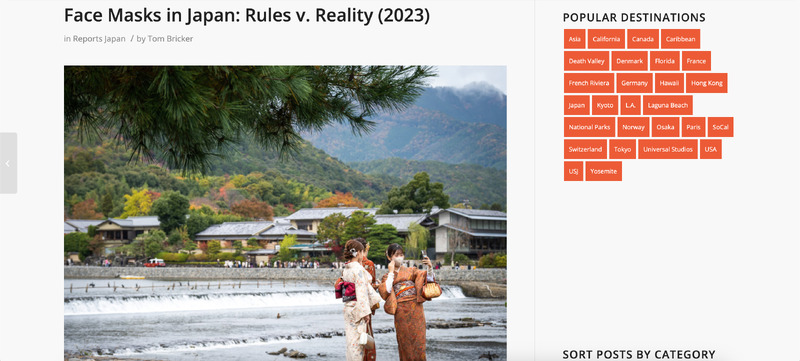 2023-05-15
2023-05-15Unique Patterns of Behaviors Observed from Endless Masking in Japan in this "Post-Pandemic"
Although the world is approaching the post-pandemic, many people are still wearing masks in Japan. It can be attributed to unique conformity to others who still wear a mask and the establishment of masking as a habit after 3 years of masking. -
2020-05-02
Social distancing
This photo is taken from the CSI Public History Coronavirus Chronicle Facebook page. (May 2, 2020, author unknown) I look at this photo and remember when social distancing was still fresh and new and everyone did it. Now, it feels like people are starting to lose that boundary of personal space and wanting to stand as close as they can behind you in a check out line. I remember actually enjoying the distance people were forced to take, and a part of me wishes social distancing was still in effect. -
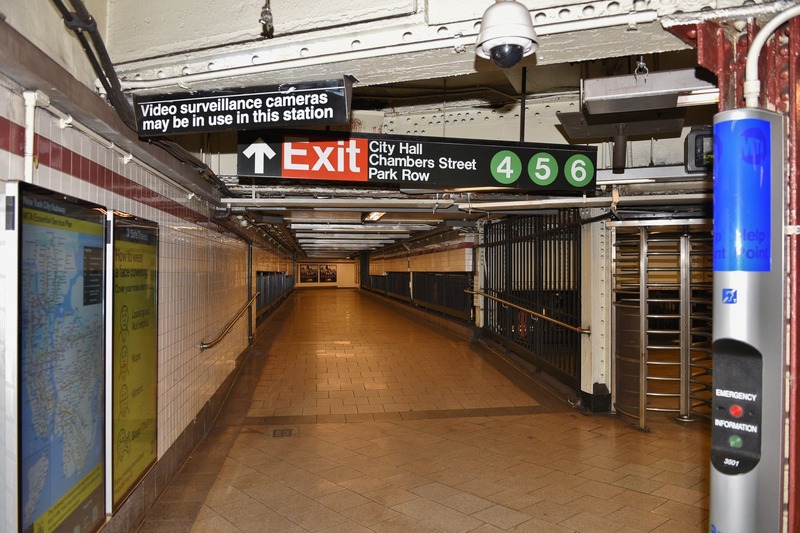 2020-07-27
2020-07-27Desolation
The moment I saw this photo, I felt the profoundness of it. The New York subway system empty. Normally people would be walking through these gates, flooding the long hall between trains and destinations. The thing that strikes me more than the emptiness is the long tunnel leading to the exit. Well over 100 feet long the tunnel seems to go on forever, a feeling that mimics the endless period of the covid lockdown. It just felt as if it would never end, and now, looking at the tunnel I feel a sense of sadness, as if a year of my life was wasted, one that no matter how much I try to forget, I cannot. -
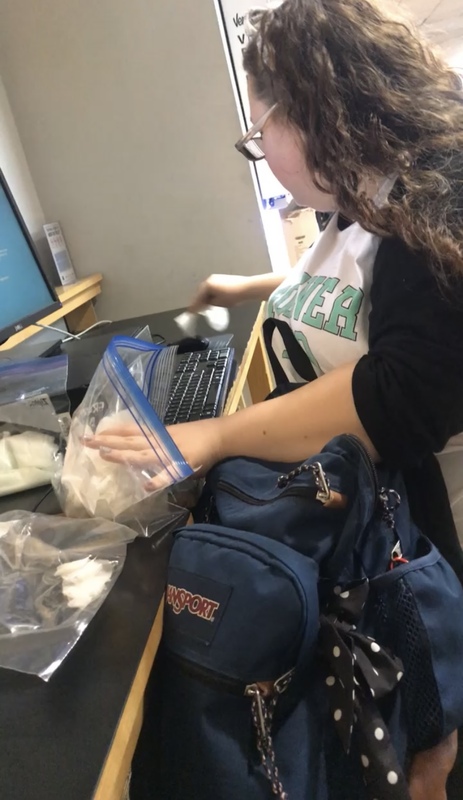 2020-03-11
2020-03-11CUNY closures
I took this photo of my friend, Sarah, cleaning everything she would be touching in March of 2020, the same day CUNY announced they would be closing due to COVID-19. I remember thinking she was silly for her paranoia. I was in denial that anything was really happening, and I think that was me trying to keep myself calm in all of the uncertainty of what was going to be happening. Looking back, Sarah was valid in her fears of this virus. The seriousness of the situation did not hit me until the announcement of the closure of CUNY schools. -
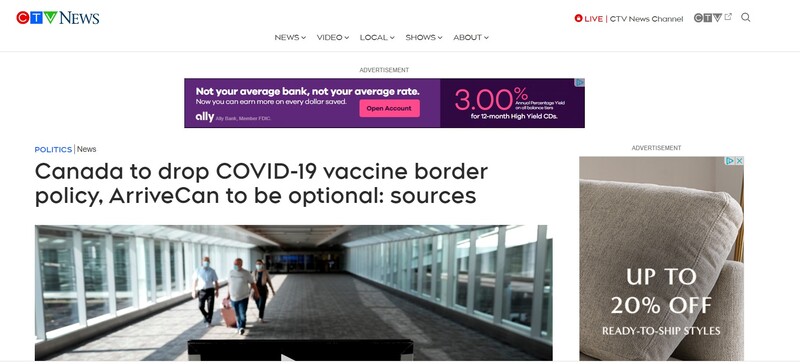 2022-09-21
2022-09-21ArriveCan application and Canada's COVID-19 vaccine border requirements
This news article reports Canada's plan to drop its COVID-19 vaccine border requirements, make the ArriveCan application optional, and possibly end COVID-19 testing for travelers by the end of September 2022. This news shows how the COVID-19 pandemic impacted travel and border relations between countries (Canada and US). -
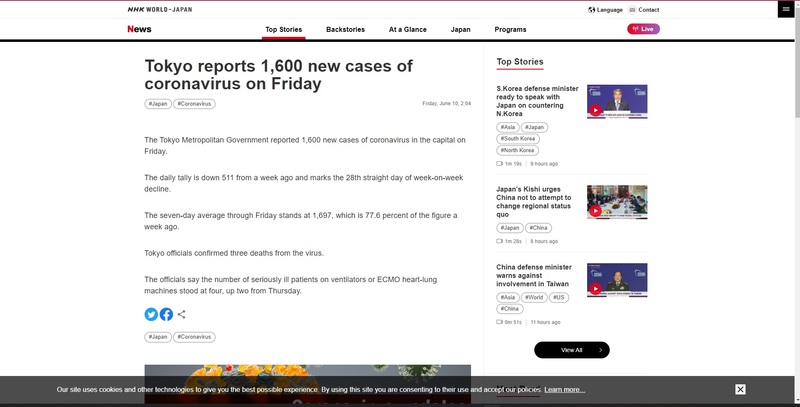 2022-06-10
2022-06-10Tokyo reports 1,600 new cases of coronavirus on Friday
This is an article from NHK World-Japan. There have been more COVID-19 cases reported in Tokyo, Japan. However, the article reports that the cases have been in decline despite these new 1,600 cases. The Japan Times website, they have a timeline that discusses the same 1,600 new cases, but also shows an Outbreak map of Japan's current cases, deaths, testing, and other things. This is a reminder that Japan is still struggling with the virus, but there is some hope with the cases decreasing weekly. -
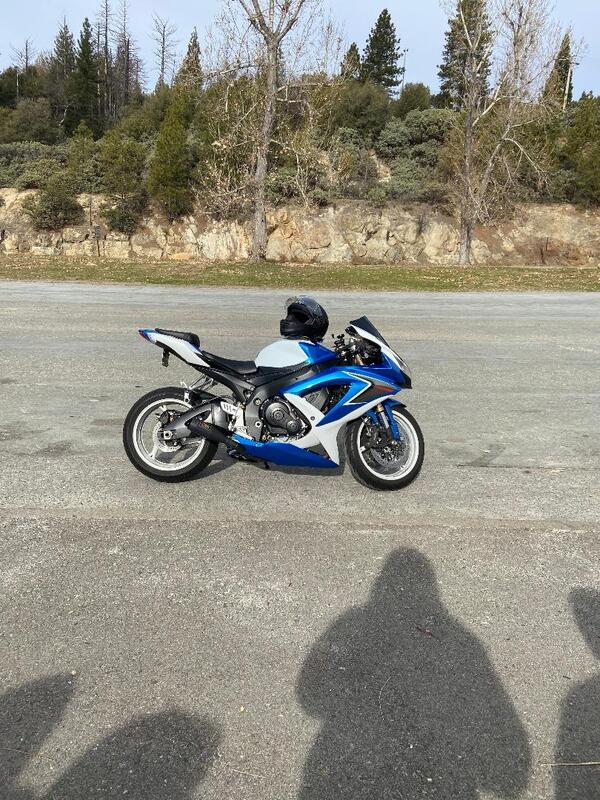 2022-05-20
2022-05-20How covid didn't really effect me.
My name is Kasper, I live in the U.S. and I was 24 at the time the novel corona virus first started to cause shutdowns nation wide and world wide. I did not have the luxury of staying sheltered in place as I worked for a company that was deemed necessary to operate no matter what. My co-workers and I were basically told that our company will close when the federal government completely shuts down. That never happened. All throughout the pandemic I did not notice many changes to my life other than lack of major social events. I still hung out with friends and didn't really take the whole shut down seriously. I never had anything major happen to anyone I knew until the second year. That being said I never felt that hiding was going to solve the whole pandemic issue as many people believed it would. I spent a lot of time riding motorcycles with my wife and friends living my life to the best of my ability. One thing that did change was the whole mask dilemma. I wasn't someone against masks but I do wish the whole situation would have been handled differently. I feel that the picture above can illustrate that I did not nor will I ever let anything stop me from living and enjoying my life -
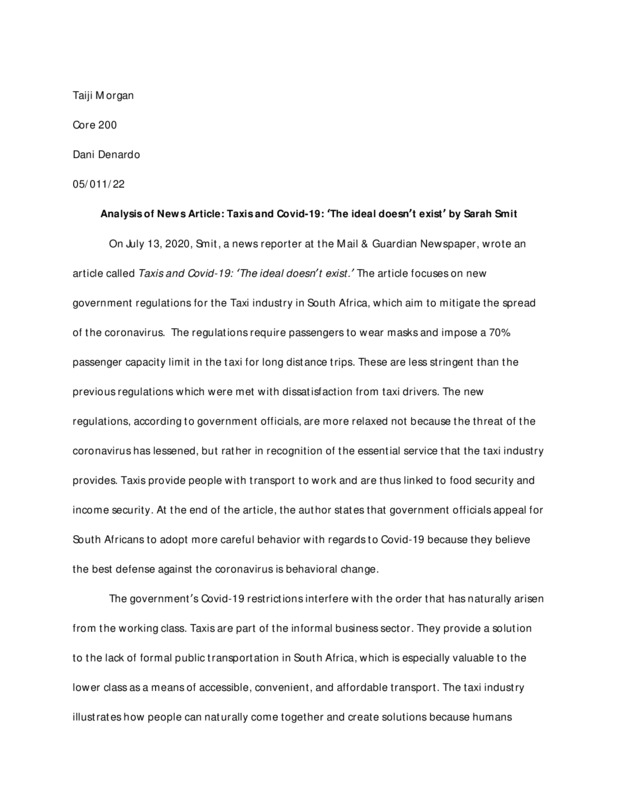 2022-05-16
2022-05-16Analysis of a news article about state restrictions on the informal taxi industry in South Africa
I am from South Africa. I wrote this analysis of a news article about Covid-19 regulations on the taxi industry in South Africa because during the pandemic I have heard many middle class people complain that working class people are irresponsible for traveling in crowded taxi's to work. My analysis pushes against this narrative, and illustrates how restricting the taxi industry is unjust, oppressive and unhelpful. Moreover, I suggest some alternative ways government can be helping. -
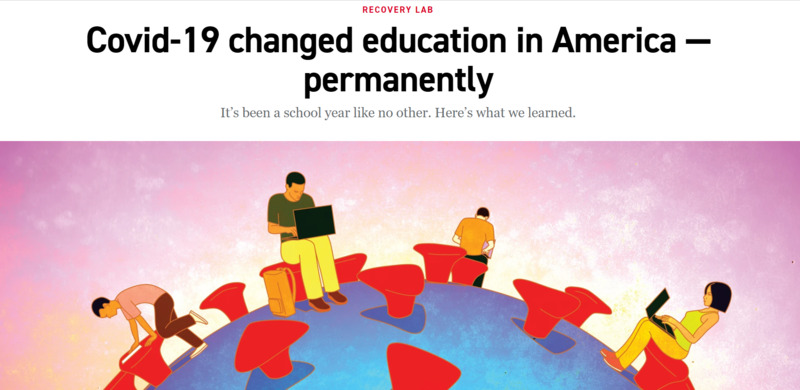 2021-04-15
2021-04-15COVID-19 Changed Education in America
The pandemic has completely changed education. Students' views and attitudes towards school has changed, as well as been impacted by trauma and lack of normal school routine. School districts and teachers have been scrambling to accommodate to the new change while also trying to maintain a feeling of being "normal" during a pandemic. -
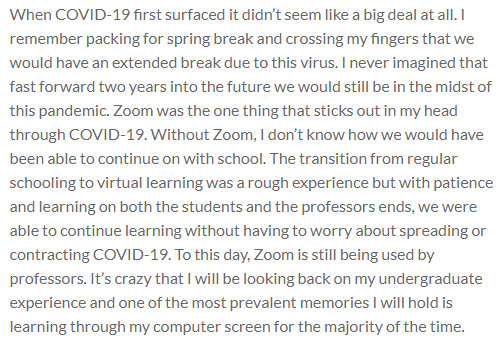 2020-03
2020-03ZOOM University
When COVID-19 first surfaced it didn’t seem like a big deal at all. I remember packing for spring break and crossing my fingers that we would have an extended break due to this virus. I never imagined that fast forward two years into the future we would still be in the midst of this pandemic. Zoom was the one thing that sticks out in my head through COVID-19. Without Zoom, I don’t know how we would have been able to continue on with school. The transition from regular schooling to virtual learning was a rough experience but with patience and learning on both the students and the professors ends, we were able to continue learning without having to worry about spreading or contracting COVID-19. To this day, Zoom is still being used by professors. It’s crazy that I will be looking back on my undergraduate experience and one of the most prevalent memories I will hold is learning through my computer screen for the majority of the time. -
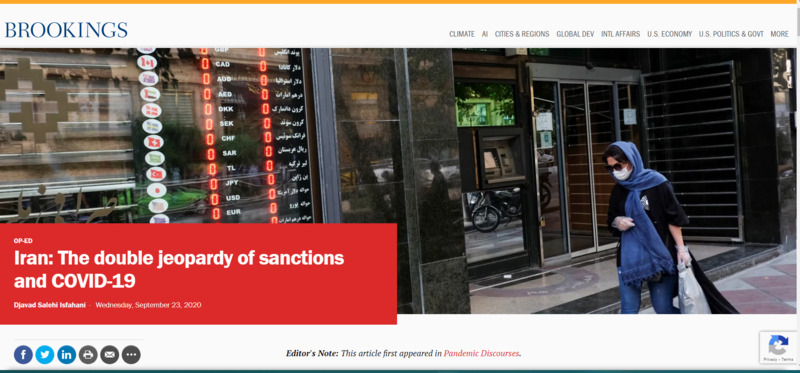 2020-09-23
2020-09-23Iran: The double jeopardy of sanctions and COVID-19
This article discusses the effects of Covid-19 on Iran and how the sanctions imposed on Iran by the Trump administration exacerbated Covid’s effect on Iran’s already weak economy. It highlights Iran’s attempts to reduce the fatality rate despite a shortage of medical supplies. Additionally, the article posits that lifting sanctions during the pandemic might have reduced the death toll by thousands. While there is speculation that the true number of Covid deaths in Iran has been reduced and even misreported, this article highlights the connection between U.S. politics and the effects of sanctions imposed on countries during a public health crisis. -
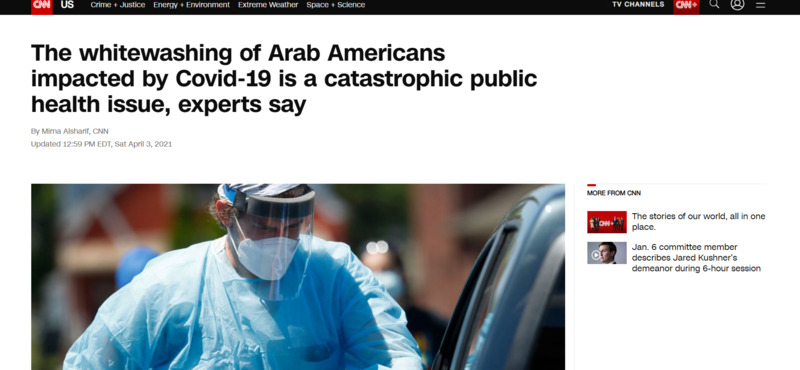 2021-04-03
2021-04-03The whitewashing of Arab Americans impacted by Covid-19 is a catastrophic public health issue, experts say
This article brings up important points regarding the underrepresentation of Middle Eastern and North African (MENA) people and communities in U.S. This article focuses primarily on Arab Americans, but also sheds light on the fact that there are no identifiers for Middle Eastern and North African people on the U.S. Census as their only options are to choose “white” or “other”. As a result, there is a lack of Covid-19 data specific to these communities which prevents support and information being directed to those underrepresented – and often socioeconomically underprivileged – groups. This article is important in demonstrating the vulnerability of this group. Many MENA families live in multi-generational homes, have preexisting medical conditions or risk factors which may make them more vulnerable should they contract Covid, and still some do not have access to the information and support needed to prevent Covid or to receive the proper treatment if infected. Additionally, because MENA people are not able to self-identify on the U.S. Census, the information about how these communities are being affected is not accurate. The U.S. Census isn’t the only place where these identifiers do not exist. Job, scholarship, and college applications (to name only a few) do not provide accurate identifiers for MENA individuals. I think this article is important in revealing the lack of identifiers available to MENA people and how important it is that this is changed soon. -
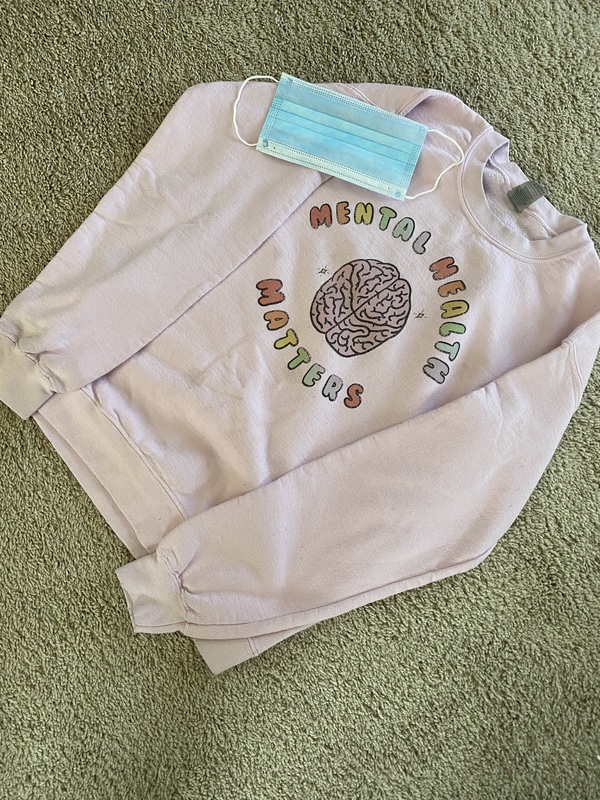 2022-03-26
2022-03-26Coping with the Pandemic--A Personal Look at Mental Health and COVID-19
According to the Center of Disease Control, in June of 2022, US adults reported considerably elevated adverse mental health conditions associated with COVID-19. Out of a survey they did on 5,412 people, 40.9 percent of respondents reported at least one adverse mental or behavioral health conditions, including symptoms of anxiety and depressive disorder which were around 31 percent. One of the causes of this is due to increase sedentary behaviors and low levels of physical activity due to quarantines and lack of business operation. Over the past two years, government mandated quarantine, work from home, and online schooling has caused me to stay at home for longer periods of time than what I use to. Because of this sedentary behavior, I had dealt with the negative effects of isolation, stress, and anxiety on both my mental and physical health. According to the World Health Organization, 150 minutes of moderate exercise or physical activity is usually recommended per week, however, with working a full-time job and being in school, the question that remains is how that is possible? I have learned to accommodate these physical needs indoors, by taking active breaks during the day and exercising at home. While this does not necessarily help with isolation and loneliness sometimes, I have learned to take these matters one day at a time and not shun myself for feelings them. CDC argues that from a recent comprehensive review that the impact of COVID-19 on mental health particularly seems to affect more young women disproportionally than any other group. Therefore, I recommend any young adult or women facing severe mental health to take advantage of online support or mental health services through telehealth such as ZocDoc. It is important to highlight COVID-19's impact on mental health in the United States and my personal life because it shows how the pandemic changed the means and the ways we received mental health services in the past. As the pandemic ventures on, people like myself will continue to have to find ways to cope and receive services for our problems. Thanks to the pandemic, much of our mental health problems have come more to the forefront due to us having ample amounts of time now to navigate and deal these issues unlike never before. -
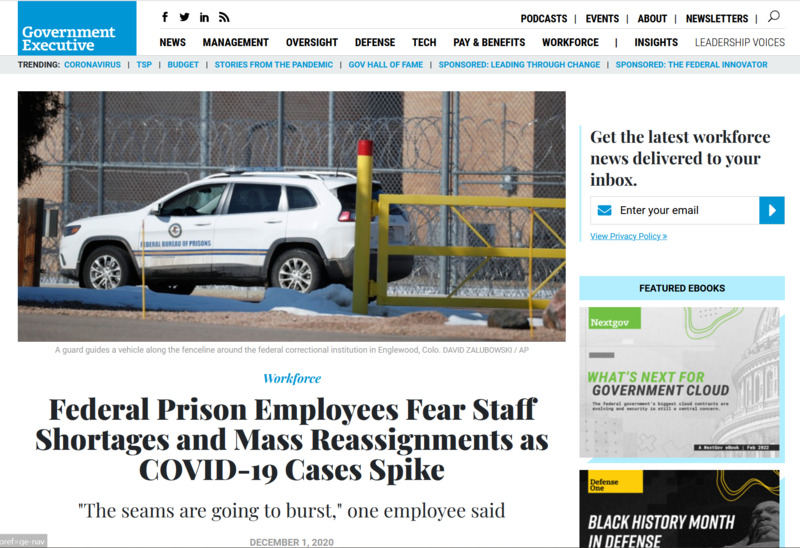 2022-03-26
2022-03-26Locked In and Locked Down: Surviving COVID-19 in FCI Edgefield BOP
The COVID-19 crisis has impacted mass incarcerated facilities at an exceeding rate, exacerbating existing staffing shortage and leaving those housed in large numbers increasingly vulnerable to COVID-19. The Federal Correctional Institution in Edgefield, South Carolina is no exception to this hardship. FCI Edgefield has be forced to expand its use of a practice called "augmentation" or allowing those in non-correctional roles at the prison to work in correctional officer roles. This is because staff members are getting sick an exceedingly high rate, causing some staff to have quarantine for several days while others have chosen to retire early out of the fear of high exposure and incentives losing way due to the crisis. Since the pandemic has taken off, only a small number of inmates have died from COVID-19, about 50 in total. Yet, due to less experienced staff on site due to shortages, one inmate died due to undermined symptoms on January 27, 2021. Overall, stories like these are important because they show how state officials, lawmakers, and policymakers have made little strides in reducing and slowing down the spread of the coronavirus in state and national prison systems. People like my mother, who works at FCI Edgefield, have preexisting medical conditions that put them at a heightened risk for complications if they were to catch COVID-19. Thus, we should make aware that these state officials have waited too long to make strides towards reducing the prison population, routinely rotating staff, and increasing social distance measures in the jail populations. As the pandemic wears on, much is still needed to be done in prioritizing staff and prison populations for vaccination matters. While this idea has generated some wide societal debate, I find it hard to argue that people who work and live in correctional facilities are at a major disadvantage in this crisis. Therefore, it is only fair to consider these high-risk groups first when prioritizing phases and measures of the vaccines and health and well-being. -
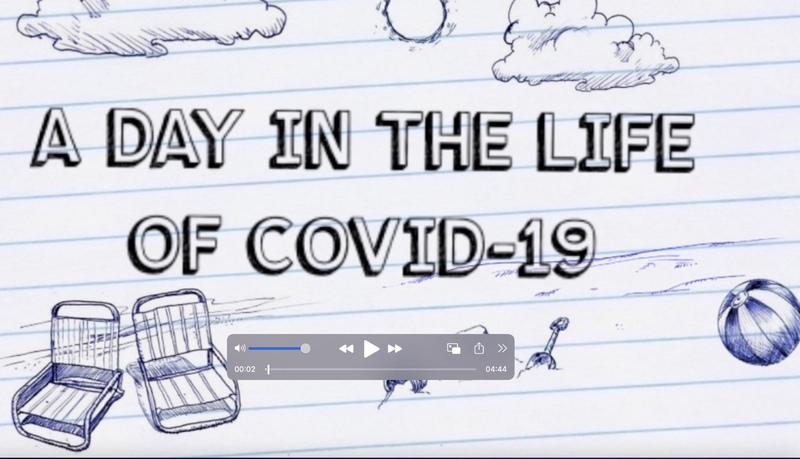 2022-03-16
2022-03-16Navigating through COVID-19: A Personal Vlog of Ashley Hampton
Spend a day with me as you see me (Ashley Hampton) navigate through a normal day in present COVID-19 in Anderson, South Carolina. I vlog about my workplace, shopping centers, and businesses in Anderson to give perspective of how COVID-19 has changed the way these institutions function on a day-to-day basis. Despite statewide coverage, not much is documented about South Carolina and COVID-19 in this archive, let alone, residential experiences. The objective of this video is added to the South Carolina COVID archive as well as highlight how personal experiences with COVID-19 may vary depending on which region you live in and community. -
2020-09-20
Discovering You Have COVID19
It was September of 2020, and I was babysitting at the time. The kids I was babysitting for were sick, but I did not think much of it, babies are sick all the time right? So, I continue going to work throughout the week. I am changing the diaper of the child, and may I add that this is a dirty, poopy diaper. I am thinking in my head, "Wow it is kind of crazy that this does not smell bad, it ALWAYS does." Suddenly it clicks in my head, I cannot smell. I go smell a candle, smells like nothing, an onion, nothing, perfume, nothing, and I am instantly in a panic. I am then wondering if I can taste anything, I try every food in the pantry, again... nothing. I immediately tell the mom I babysit for (she works from home), and she tries smelling her candle, and she smells nothing either. We go together and get tested, and we all had COVID19. We all ended up being okay and quarantine for 10 days, so its okay to laugh at the situation now. That was my most memorable moment of COVID19. -
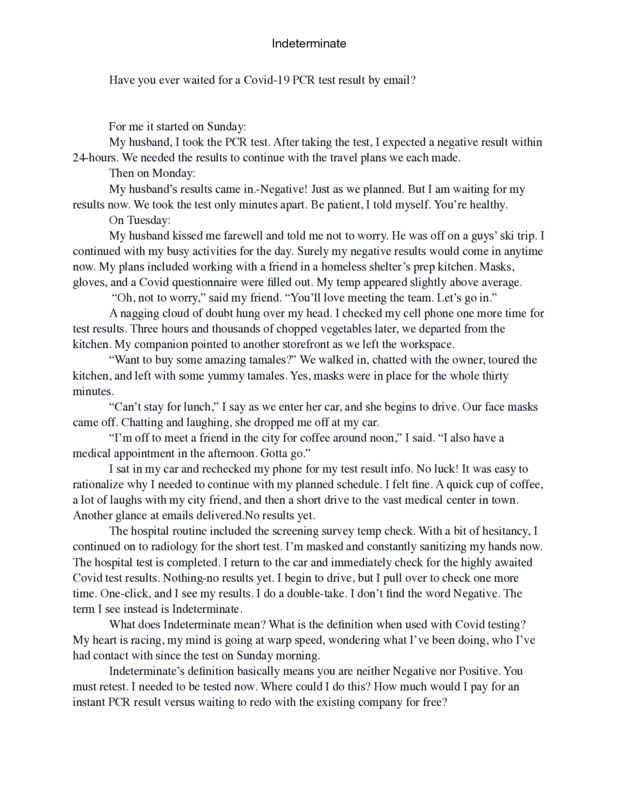 2022-02-01
2022-02-01Indeterminate
Stress is associated with the past two years. This incident was one of my most stressful contact with Covid-19 testing. You'd win the bet if you guessed there is a happy ending. -
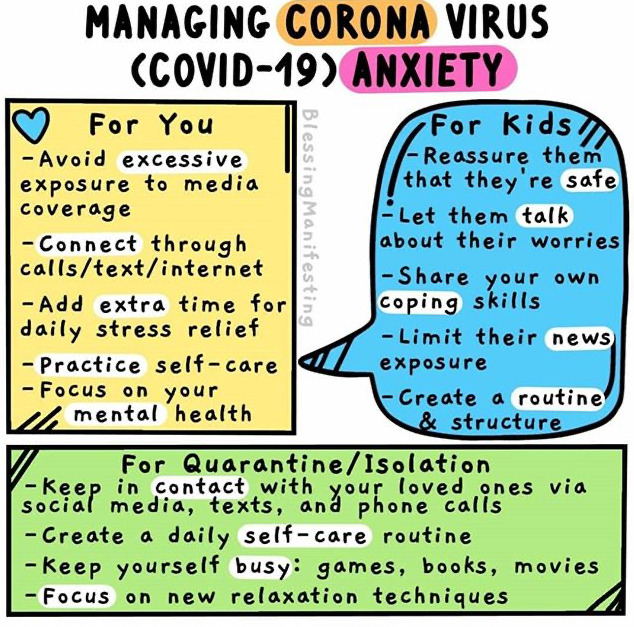 2020-03
2020-03Suffering from Anxiety
As most young adults my age, I suffer from severe anxiety. Dealing with anxiety daily, can be very challenging at times, especially during a pandemic. I have been fighting a battle with anxiety most of my life. At this point, I am really used to the extra thoughts in my head. I have learned to help manage it, but not completely get rid of it. I believe that anxiety has made me who I am, in a way, because I do not remember a time where I was not struggling. In 2020, a pandemic instantly flooded the world. This completely impacted my entire life. I was not able to experience my last year in high school, I was not able to be around the one person that helped me with my anxiety, etc. I was forced to wear a mask that I could barely breathe in. I lost touch with most of my friends that I developed over my lifetime. This instant wave of depression suddenly hit me. I was so nervous on what would happen next, and how long will this last. People were dying from this pandemic. I constantly worried about if the sickness would hurt one of my family members or someone important to me. Over the time of being in quarantine, I thought to myself ways on how I could relax and not worry so much about the pandemic. I told myself every day, “Everything happens for a reason”. This is what I truly believe and for some reason it really does calm me down. I am Catholic. I am a very deep believer in God. To me, trusting in the Lord is the best anxiety reliever around. Covid-19 is still around today. Without Covid-19, I would not be where I am today. Although this pandemic has an abundance of negative impacts on my life, it also had some positive ones, too. I would not have attended Duquesne University, met so many amazing people, and made a plethora of memories that I would not trade in for. I believe talking about my anxiety, especially during the pandemic, is very critical because I am not the only one who is suffering, too. Everyone is nervous about what is going to happen next. To me, this is HUGE on helping me with my anxiety. I can finally think to myself that I am not alone. I believe that people who suffer from anxiety, especially from the pandemic started in 2020, can have a place to go if they are nervous. When I was struggling, I felt alone, and I was the only person who felt this way. My story will allow people to realize that they are not alone. Everyone is dealing with this stress and anxiety that I suffered from. My story tells people that I have worries and doubts, too. The pandemic not only had negative impacts, but they also had positive impacts. Focusing on the positives, will distract you from the anxiety and worrying. My story should help prove that. My story should allow people to see and find new ways to cope with the stress. I hope my story leaves a positive impact on people who did or are struggling. Everyone is in this together, and nobody will be alone in this major impact on the world. -
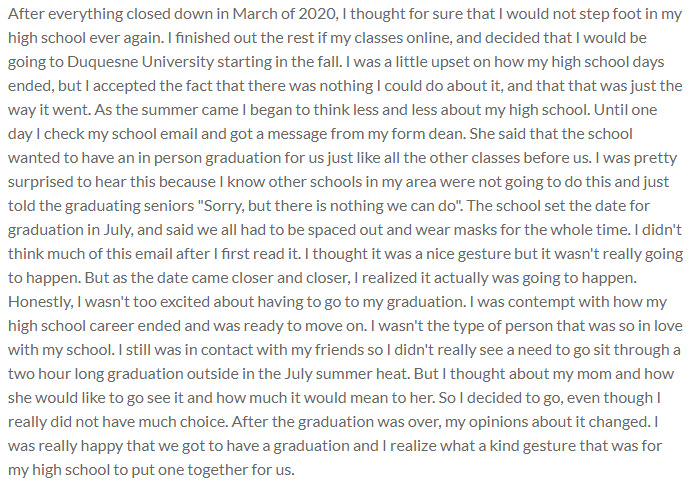 2022-02-06
2022-02-06Graduation in 2020
After everything closed down in March of 2020, I thought for sure that I would not step foot in my high school ever again. I finished out the rest if my classes online, and decided that I would be going to Duquesne University starting in the fall. I was a little upset on how my high school days ended, but I accepted the fact that there was nothing I could do about it, and that that was just the way it went. As the summer came I began to think less and less about my high school. Until one day I check my school email and got a message from my form dean. She said that the school wanted to have an in person graduation for us just like all the other classes before us. I was pretty surprised to hear this because I know other schools in my area were not going to do this and just told the graduating seniors "Sorry, but there is nothing we can do". The school set the date for graduation in July, and said we all had to be spaced out and wear masks for the whole time. I didn't think much of this email after I first read it. I thought it was a nice gesture but it wasn't really going to happen. But as the date came closer and closer, I realized it actually was going to happen. Honestly, I wasn't too excited about having to go to my graduation. I was contempt with how my high school career ended and was ready to move on. I wasn't the type of person that was so in love with my school. I still was in contact with my friends so I didn't really see a need to go sit through a two hour long graduation outside in the July summer heat. But I thought about my mom and how she would like to go see it and how much it would mean to her. So I decided to go, even though I really did not have much choice. After the graduation was over, my opinions about it changed. I was really happy that we got to have a graduation and I realize what a kind gesture that was for my high school to put one together for us. -
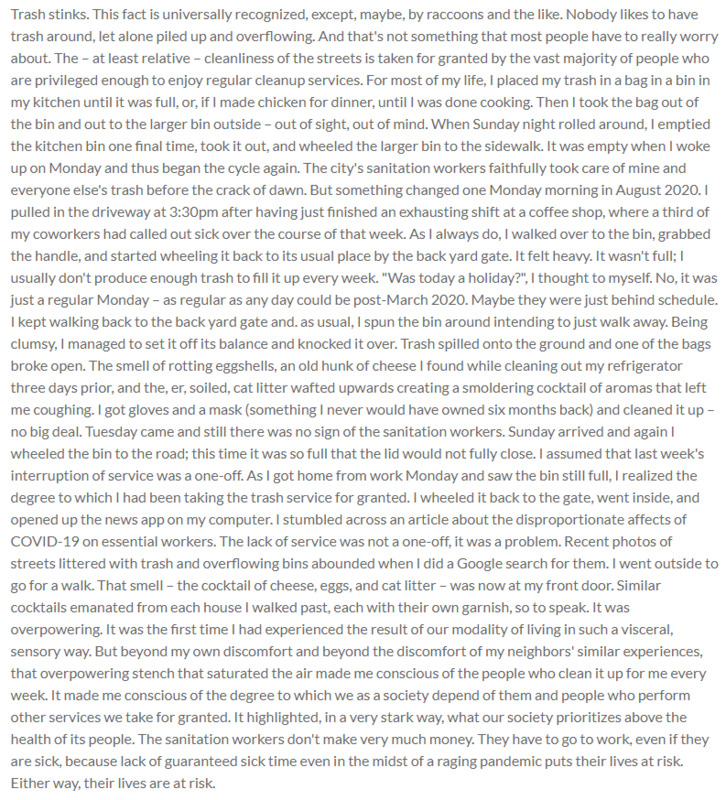 2020-08-10
2020-08-10Smelling the labor shortage
Trash stinks. This fact is universally recognized, except, maybe, by raccoons and the like. Nobody likes to have trash around, let alone piled up and overflowing. And that's not something that most people have to really worry about. The – at least relative – cleanliness of the streets is taken for granted by the vast majority of people who are privileged enough to enjoy regular cleanup services. For most of my life, I placed my trash in a bag in a bin in my kitchen until it was full, or, if I made chicken for dinner, until I was done cooking. Then I took the bag out of the bin and out to the larger bin outside – out of sight, out of mind. When Sunday night rolled around, I emptied the kitchen bin one final time, took it out, and wheeled the larger bin to the sidewalk. It was empty when I woke up on Monday and thus began the cycle again. The city's sanitation workers faithfully took care of mine and everyone else's trash before the crack of dawn. But something changed one Monday morning in August 2020. I pulled in the driveway at 3:30pm after having just finished an exhausting shift at a coffee shop, where a third of my coworkers had called out sick over the course of that week. As I always do, I walked over to the bin, grabbed the handle, and started wheeling it back to its usual place by the back yard gate. It felt heavy. It wasn't full; I usually don't produce enough trash to fill it up every week. "Was today a holiday?", I thought to myself. No, it was just a regular Monday – as regular as any day could be post-March 2020. Maybe they were just behind schedule. I kept walking back to the back yard gate and. as usual, I spun the bin around intending to just walk away. Being clumsy, I managed to set it off its balance and knocked it over. Trash spilled onto the ground and one of the bags broke open. The smell of rotting eggshells, an old hunk of cheese I found while cleaning out my refrigerator three days prior, and the, er, soiled, cat litter wafted upwards creating a smoldering cocktail of aromas that left me coughing. I got gloves and a mask (something I never would have owned six months back) and cleaned it up – no big deal. Tuesday came and still there was no sign of the sanitation workers. Sunday arrived and again I wheeled the bin to the road; this time it was so full that the lid would not fully close. I assumed that last week's interruption of service was a one-off. As I got home from work Monday and saw the bin still full, I realized the degree to which I had been taking the trash service for granted. I wheeled it back to the gate, went inside, and opened up the news app on my computer. I stumbled across an article about the disproportionate affects of COVID-19 on essential workers. The lack of service was not a one-off, it was a problem. Recent photos of streets littered with trash and overflowing bins abounded when I did a Google search for them. I went outside to go for a walk. That smell – the cocktail of cheese, eggs, and cat litter – was now at my front door. Similar cocktails emanated from each house I walked past, each with their own garnish, so to speak. It was overpowering. It was the first time I had experienced the result of our modality of living in such a visceral, sensory way. But beyond my own discomfort and beyond the discomfort of my neighbors' similar experiences, that overpowering stench that saturated the air made me conscious of the people who clean it up for me every week. It made me conscious of the degree to which we as a society depend of them and people who perform other services we take for granted. It highlighted, in a very stark way, what our society prioritizes above the health of its people. The sanitation workers don't make very much money. They have to go to work, even if they are sick, because lack of guaranteed sick time even in the midst of a raging pandemic puts their lives at risk. Either way, their lives are at risk. -
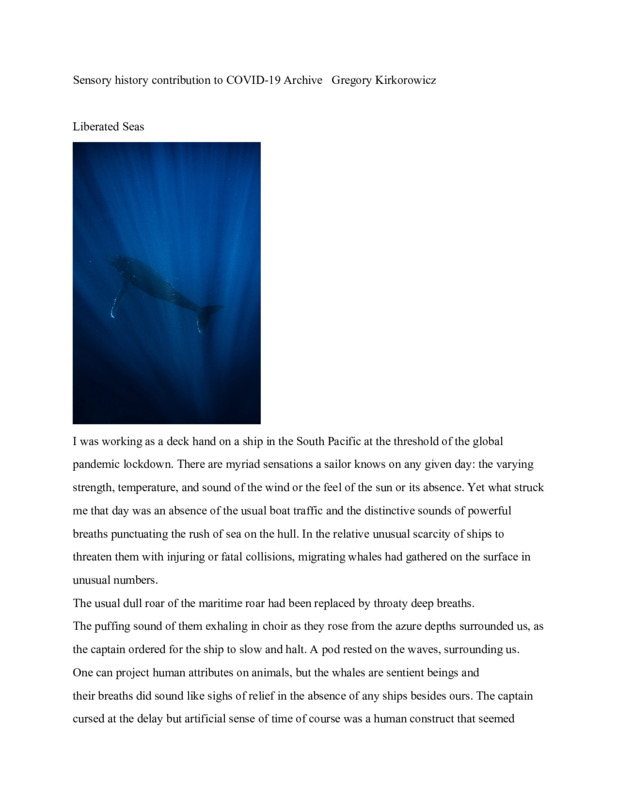 2020-03-07
2020-03-07Liberated Seas
I was working as a deck hand on a ship in the South Pacific at the threshold of the global pandemic lockdown. There are myriad sensations a sailor knows on any given day: the varying strength, temperature, and sound of the wind or the feel of the sun or its absence. Yet what struck me that day was an absence of the usual boat traffic and the distinctive sounds of powerful breaths punctuating the rush of sea on the hull. In the relative unusual scarcity of ships to threaten them with injuring or fatal collisions, migrating whales had gathered on the surface in unusual numbers. The usual dull roar of the maritime roar had been replaced by throaty deep breaths. The puffing sound of them exhaling in choir as they rose from the azure depths surrounded us, as the captain ordered for the ship to slow and halt. A pod rested on the waves, surrounding us. One can project human attributes on animals, but the whales are sentient beings and their breaths did sound like sighs of relief in the absence of any ships besides ours. The captain cursed at the delay but artificial sense of time of course was a human construct that seemed so dwarfed then by those giant breaths, a reminder of the primal rhythms of the sea and that we were ultimately an invasive species humbled by a virus and the natural power of the ocean. -
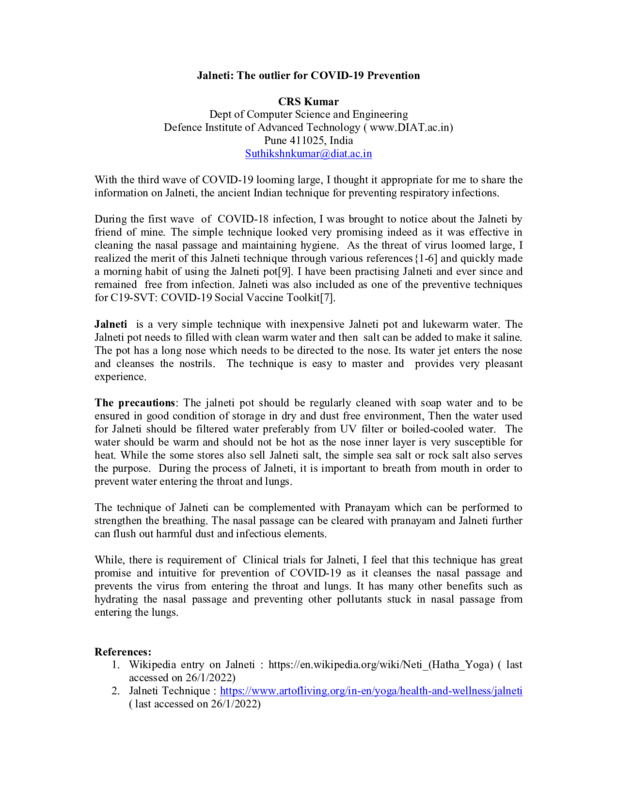 2022-01-26
2022-01-26Jalneti: The outlier for COVID-19 Prevention
Jalneti, an ancient technique as preventive measure for COVID-19. -
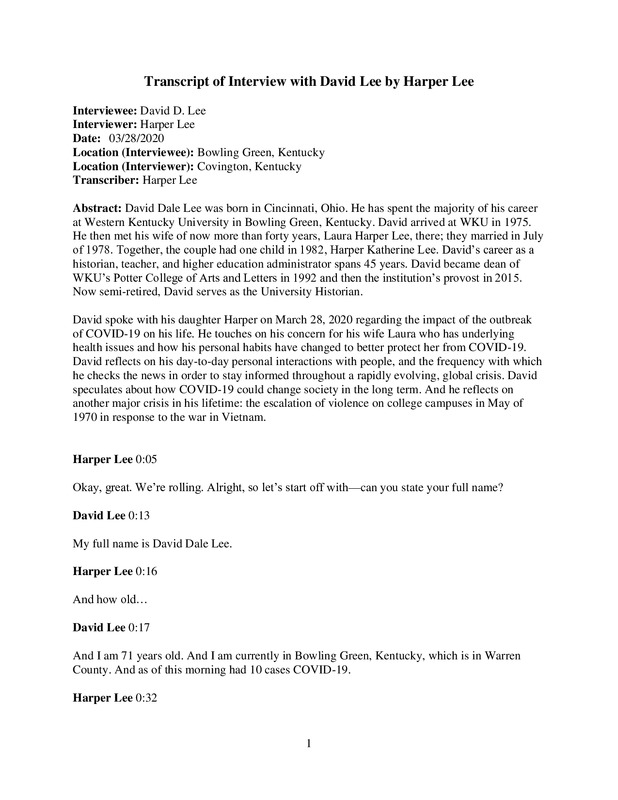 03/28/2020
03/28/2020David Lee Oral History, 2020/03/28
David Dale Lee spoke with his daughter Harper Lee on March 28, 2020, regarding the impact of the outbreak of COVID-19 on his professional and personal life. David is a semi-retired professor of history at Western Kentucky University in Bowling Green, Kentucky. David primarily discusses the impact of the pandemic on his teaching and research projects, but he also touches on changes to personal life, particularly shopping and connecting with friends via Zoom. David also reflects on other crises that have shaped his life. -
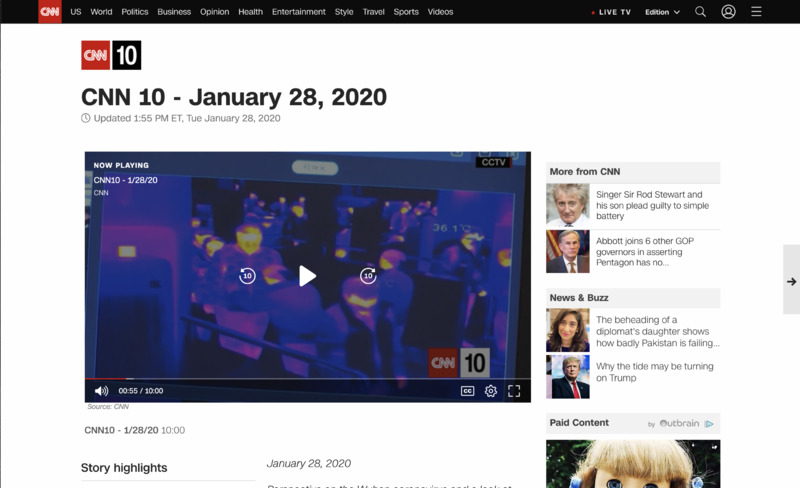 2020-01-28
2020-01-28Predicting the Future
I remember very specifically sitting in my Econ class my senior year of high school; we had to watch a CNN 10 video every week and explain how the things in the video could affect the economy. I remember looking my Econ teacher in her eyes and telling her that I thought the Coronavirus was going to be very serious and deadly. She told me that a few dead in China and a few cases in other countries doesn't mean that it will be a big problem. My whole class laughed at me because I was worried that the Coronavirus was going to come to the U.S. and kill a lot of people. That was January 28th, 2020. Cut to March 13th, 2020 Corona was in the U.S. and was spreading very rapidly. March 13th, 2020 was the last day of my senior year without me knowing it. We were told that we were getting an extended spring break and would be out of school for 2 weeks then we would be back. That did not happen. I never stepped foot into my high school again. We started Zoom classes on March 31st, 2020, and I never saw my high school teachers in person again. I didn't get a senior prom, proper graduation, or a school picture to show my future kids. Covid-19 ruined my senior year and would go on to ruin my first year of college, forcing me to drop out for the safety of my family and friends. -
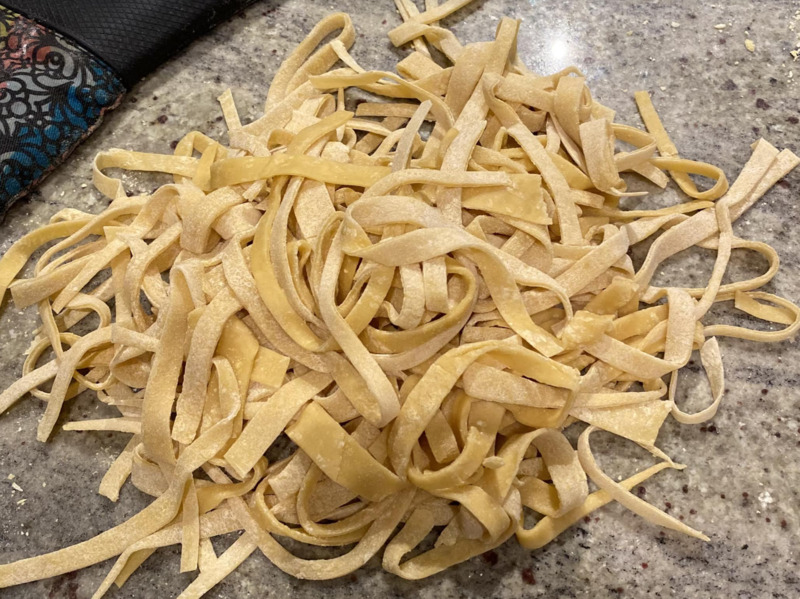 2021-12-17
2021-12-17Cooking During Covid
These photos are a couple of many foods I have created during the Covid-19 pandemic. Although these times were depressing and lonely in ways it was a gift for me to be given the time to find my passion as a chef. Homemade pasta takes 2+ hours, and homemade bread takes 4+ I never would have had the time to do this before Covid. I think that during this time it is very important to find a little bit of light in a time of darkness, and that's what I did. -
2021-12-16
Cheering NYC
When the pandemic was at its peak, 7pm was when those who lived in New York City would stick their heads out of their apartments, from which they would sit day after day. Together, we clanged pots and pans in celebration of the frontline workers and honored those who survived, or who had been lost to COVID-19. -
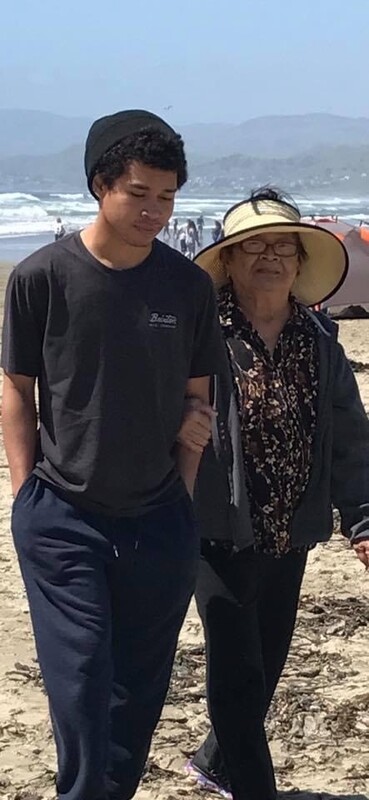 2021-12-10
2021-12-10My Time During Covid-19
During the Covid-19, I experienced a stressful time period just like most people. When the lockdown first happened I was scared and uncertain of what would happen. It was the first time in my life that I have ever had the feeling of being unable to hang out with friends and see family members. Many people I knew were still hanging out with people and doing social activities just like there was not a pandemic going on. I wanted to still do social activities with them and visit people but I was unsure if that was safe to do, so I decided to just stay in the house and be safe. My grandma is going through chemotherapy and I did not want her to catch covid if I did happen to get it, so my whole family was being extra careful to not catch the virus. During this time period I kept in touch with friends by playing online video games and facetiming my family members. The strangest part of this time period for me was the social aspect of the pandemic. Whenever you would go to the store in my area the shelves would be empty, and people would just walk past you and were not willing to talk to anyone. I usually take in person classes for school, and I had to make the transition to doing classes online for the first time. All sports had to cancel all of their events so I was not able to compete in any of the events for the entire year. This was definitely a year of fear and uncertainty for many people, but when I look back there were a lot of positives that happened. The most positive thing was that I got to spend a lot of time with my family. Mostly everyone in my household is busy all the time and we all never get too much time to just sit and talk even though we all live in the same house. During the lockdown we all got the chance to spend a lot of time together since there was not a whole lot going on. I was also able to spend a lot of time talking with friends that I have not talked to in a long time over online video games, and I got back into skateboarding which is a hobby that I have not done in seven years. Even though I was fearful of the virus, I experienced a time period where I could focus a lot on being as productive as possible, and it gave me a lot of gratitude for how things are today where things are mostly back to normal. Just like it was for a lot of people, there were definitely a lot of bad experiences that happened during the Covid -19 period for me, but there are also good things that I am thankful for. Hopefully people can focus on the positives that happened during that time period as we push forward past it. -
2020-03-19
Panic During a Pandemic
March 19th 2020 started off as a very normal day, I very clearly remember dropping off my son at school and heading into the office for work. I was a Senior Purchasing Agent at a fairly large IT solutions company and we were busy preparing for the Fiscal Year End as it was only a week and a half away. At around 10 am, my phone buzzed, I looked down and noticed it was an email notification from my son’s school which was fairly uncommon during school hours. I quickly opened it up and saw that the schools were going to be shut down for two whole weeks, which was absurd to me at the time, I had never heard of such a thing happening. I quickly let my supervisor know in hopes of being able to work from home. At the time we were piloting working from home one assigned day per week to see if we could make it a long term perk. She quickly approved me to stay home with my son, I am a single mother, and we all know how expensive childcare in California is. Moments later, I heard everyone who was in the office shuffle into the breakroom to watch a press conference on the news. President Trump was on the podium announcing that he was issuing a “Stay at home” order for the whole country. I immediately got chills down my spine and was in complete panic wondering how dangerous the Covid-19 virus truly was. I then quickly grabbed my phone to text in my family’s group text to check in on them. We all thought that it was absurd but understood that it was for everyone’s safety. Next, there was panic in what seemed like every corner of the United States, as almost no one had enough supplies to cover their entire families for two weeks without going to the stores. This caused complete havoc! For some reason, the hot commodity at the time was toilet paper. It was flying off the shelves and obsolete for some time. My mother and I went to stand in line the next morning at 4:45am in hopes of getting enough food and basic necessities to last our family. Upon arrive at the store about five minutes later there were a hundred people in line waiting for the store to open. Inside the store, people were dashing to get whatever they could and manners were completely out the window. It seemed very apocalyptic. Little did we know that the lockdown would not end for six months. I personally lost an aunt and very good family friend to the virus. Even today, December 10th, 2021, there are mask mandates, and now variants of the virus. Although there is only a vaccine, not a cure, we are learning how to safely navigate life again. -
 2021-05-24
2021-05-24A Glimpse of Masked Goodbyes
Ever since I was a kid, I waited for the day I would get to walk across the stage inside a huge stadium to receive my diploma, with my family and friends watching. That day did not turn out quite as expected. My senior year began in August of 2020, during the height of COVID. No one knew when or if we would be going back to school in person. We lost football games, homecoming, the senior trip, and almost two semesters of getting to spend time in class with friends. We missed out on finally being a senior. All we could hope for was to be able to have more than a drive-thru graduation. Our class was lucky enough to be able to go back to school for a few months and we got to have an in-person graduation on the football field. Even though there were only just under 200 students per day over the course of our 4-day graduation ceremonies, it was definitely an experience I will never forget. I was grateful that I got to walk across that stage with my family watching. I was grateful that I got to watch my friends who I have known for years, and with who I began this journey, get their diplomas as well. This photo encapsulates the moment that we had officially graduated. As we went in for a masked-up embrace, I thought about so much I had to go through to get to that moment. All of the highs, lows, long nights up studying, fun school events, losing friends who were near and dear to my heart, and making it through what is supposed to be the best year of high school during a worldwide pandemic. It was a bittersweet moment, marking the end of one journey, but the start of the next. I do not know what the future holds, but I hope to never have to experience more masked goodbyes. -
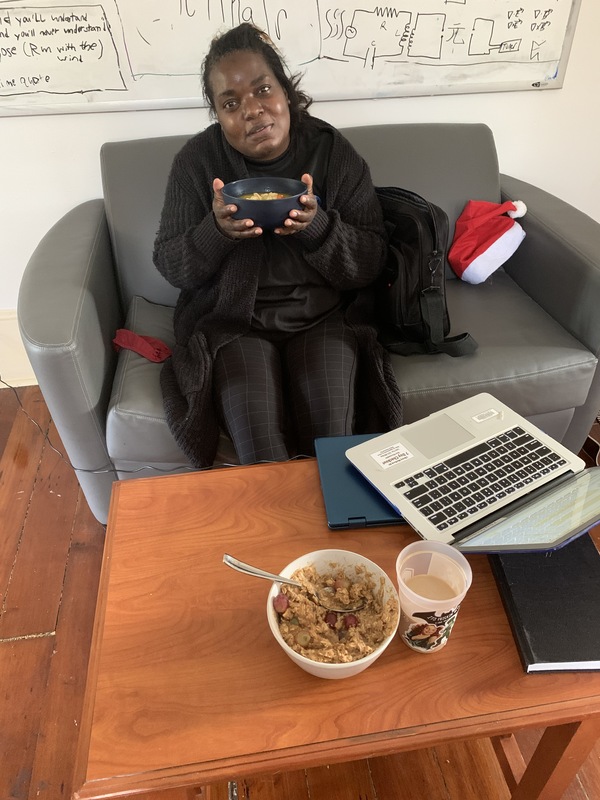 2020-02-21
2020-02-21Journey into Georgetta's Covid Experience
My name is Georgetta Jones, and I am a cashier at the College of Charleston City Bistro. Also, I work at a Daycare; Devine Daycare. As soon as Covid-19 started, I contracted it (February 2020) due to my being an 'essential worker' at my job. I was horribly laid up for fourteen days, and, as this was before the vaccines were released, I was afraid & certain I was going to die from this terrible disease. Fortunately, due to my rare blood type (O+), I had natural immunity to the virus, and was able to recover quickly after the fourteenth day; I went back to work on the 15th day. COVID-19 is a horrible virus, & it is shameful not to see people take it seriously. Due to my vitamins & water, I was able to get better quickly; it is important to take the natural precautions to protect oneself against the disease. If we as a country (and the world) are to overcome this deadly disease, we must trust in medicine, trust the doctors, trust science, and, most importantly, trust each other. -
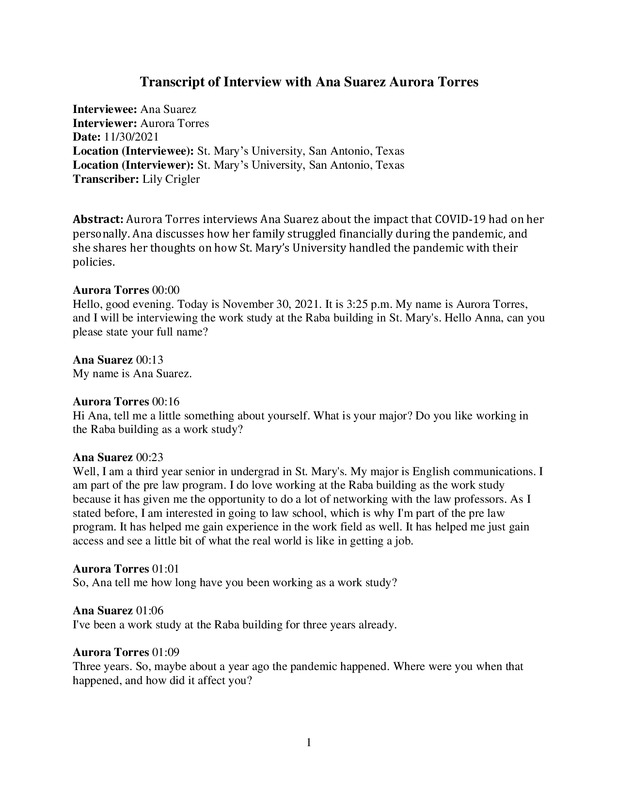 2021-12-01
2021-12-01Ana Suarez Oral History, 2021/12/01
I interviewed a student that attends St. Mary’s University and is a work study in the Law School. I wanted to get her voice out and get an idea of what her perspective was on this ongoing pandemic. Hearing her and speak about where she was when the pandemic struck really reminded me that we all faced the same problems and that no one knew what the outcome was going to be. As a student in college, I’m sure that it was just as hard to know that schools would be shutting down and having no clue as to what the next step would be. Going back home and attending class virtue was hard especially if some did not have the resources for online fees, or laptops, etc. Hearing from Ana, and knowing that she struggled financially while in quarantine and making ends meet really makes us think that everyone had it hard. But in the long run she was able to go back to school and received the vaccination and made sure she followed all the policies that were in effect at the University. At least make it feel like some things were back to normal. -
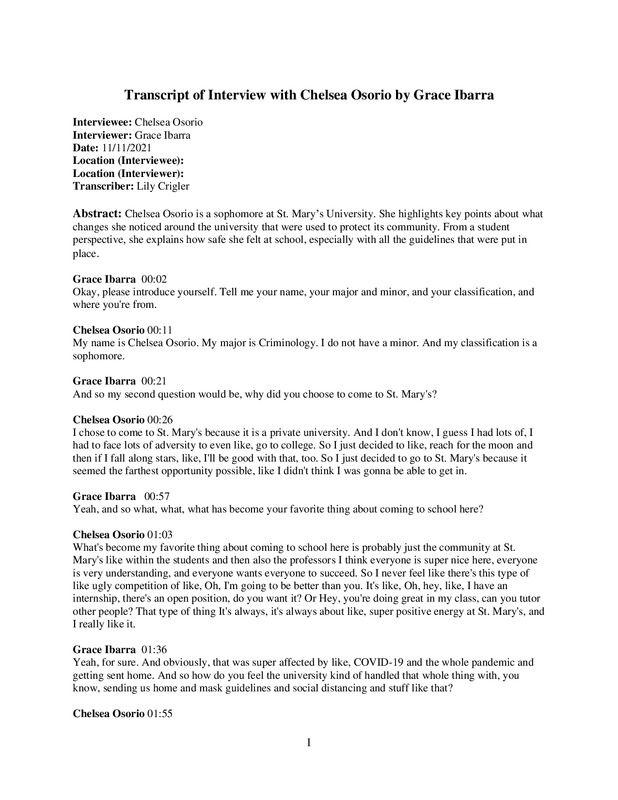 2021-11-11
2021-11-11Commuter Student Perspective on University Changes
Chelsea Osorio is a commuter student at St. Mary’s University and among the many personally affected by the COVID-19 pandemic. In her interview she highlights key points about what changes she noticed around the university that were used to protect our community. From a student perspective, she explains how safe she felt at school, especially with all the guidelines that were put in place. This goes to show how St. Mary’s students, faculty, and staff were committed to ensuring not only a healthy online environment but also making sure we returned to a safe and healthy community. -
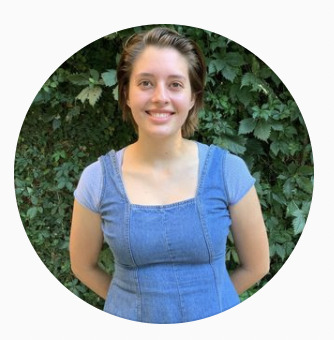 2020-03-14
2020-03-14Sarah Uhlig Oral History, 2020/03/14
During this interview, I am talking with my classmate Sarah Uhlig about our experience in the program of Empower: Ecuador, since we were both on it together. The main purpose of this interview was to get an insight into what it was for another student like me, to have missed a trip to Ecuador due to COVID-19. Just to clarify, this was not any trip. This was a missionary trip for which we were preparing ourselves to go for most of the semester. As the trip was canceled, we recognized that the program was much more than just traveling to Ecuador. Rather, the program was about our personal lives and the way in which we relate to others around us that are in different seasons and circumstances in life. Another very important thing, was self-reflection into how we were utilizing our gifts and field of interest to not only serve others but be present with others. Many things were learned from this course and Sarah, will be sharing with you her experience despite the challenges and messiness that COVID-19 brought. -
2021-10-14
Suffering of My Relatives From COVID-19
Here is a story of how the pandemic affected some relatives of mine who currently live in India. Specifically, they live in Bangalore, in South India. Between January and February of this year, they caught the COVID-19 disease. Perhaps they got it while they were in the central city shopping area doing routine shopping. In any case, it afflicted my relatives strongly. Two of them died, having succumbed to COVID-19. A significant way in which the disease tormented them was in their loss of sense of taste. Once COVID-19 affected them, beyond experiencing much fatigue, chills, and body aches, they could not taste anything. My affected aunt had apparently claimed, "Everything tastes like mud." The loss of taste, fatigue, chills, fever, and breathing difficulty are standard symptoms for the COVID-19 disease, which may appear 2-14 days after exposure to the virus. Also, the pandemic affects different individuals in different ways. The disease progresses in its affecting people, with mild symptoms eventually developing to severe illness. Unfortunately, until the COVID-19 symptoms passed, quarantine measures were taken against my relatives; they were confined within their apartments. As I am close to these people not physically but in a familial sense - as I am currently living in the US – their suffering had a great emotional impact on me; and their welfare means much to me. l can also empathize with Indian COVID-19 suffering, especially the notion of suffering due to lack of taste. Indian culture greatly values cuisine, and taste is an associated factor of cuisine; therefore, loss of taste is quite significant. -
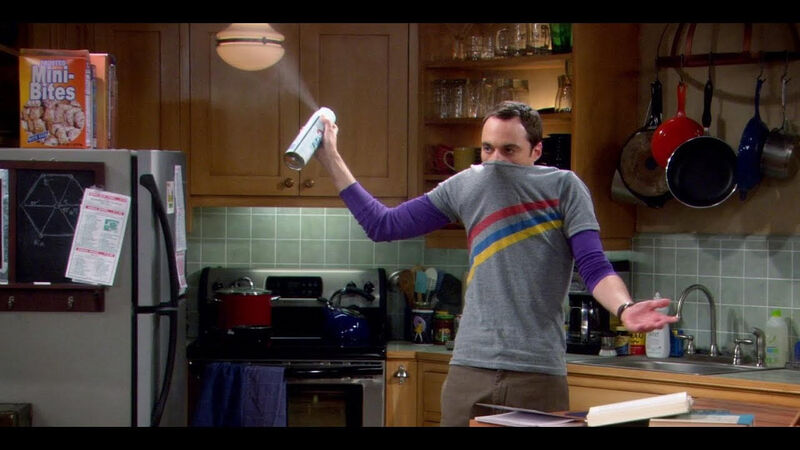 2017-03-19
2017-03-19Sweet Smell of Peroxide
You could not walk into any establishment last year without the delightful smell of disinfectant and cleaning products entering your nostrils. When I worked at Aldi and Lowes last year, the cleaning products sold out in two weeks at the start of the pandemic. The lack of these products became so bad that stores across the country had to regulate home many products consumers could buy at a time. The regulation for disinfecting the stores I worked at were in 30 minute intervals. Shopping carts, door knobs, flat surfaces, and bathrooms were all expected to be disinfected on a continuous loop. Although I agreed that these procedures were necessary, they products were used eventually caused me to develop anosmia. Today, my current job still has a huge supply of disinfectant wipes stocked up underneath the kitchen counter. This sight bewilders me because I never would have thought two years ago that having Lysol and wipes on hand would be seen as necessary now in our present future. To this day, I still cannot smell disinfectants, perfumes, and other fragrances to their entirety. I honestly see this as a blessing and curse due to past experiences with both strong aromas and odors. -
 2020-04-16
2020-04-16Covid Consolation Puppy
A week after the first shutdown began in March of 2020, schools were shut down and I was no longer able to complete my student teaching. I was furloughed from my job and locked inside for what we originally thought would be two weeks. With no end to the lockdown in sight and nothing to do, it became stressful and quite boring. Living with my parents at the time, the entire family was locked inside and tensions were high. One day, my mom got a call from a former coworker whose dog had just had puppies a month prior. She offered us a puppy and my mom, knowing how sad I was at not having a job or an internship, accepted and I was able to pick any puppy I wanted. Freyja, my dog, was my Covid-consolation-puppy. She was very young and I was up all night and all day with her, potty training and playing with her. My time was entirely consumed by this puppy and I was never bored or alone again. We joke that she was a consolation puppy because I never got to complete the typical training any teacher before received. A few months after the first shut down ASU canceled graduation and went virtual, it was another blow, and knowing I would not be able to walk the stage to get my degree was tough to handle. However, Freyja made things easier and took my mind off things. She grew with me and she became my best friend and protector. When I moved out, she kept me safe. When I separated from a long-term partner, she was what I found joy in. I love my dog very much because she came into my life when I needed her most. -
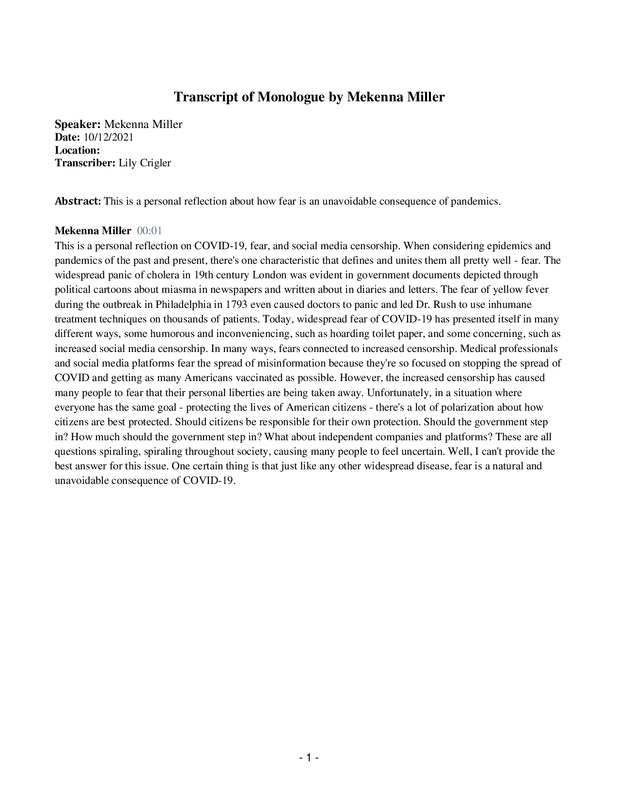 2021-10-12
2021-10-12Mekenna Miller Oral History, 2021/10/12
This is a personal reflection about how fear is an unavoidable consequence of pandemics. -
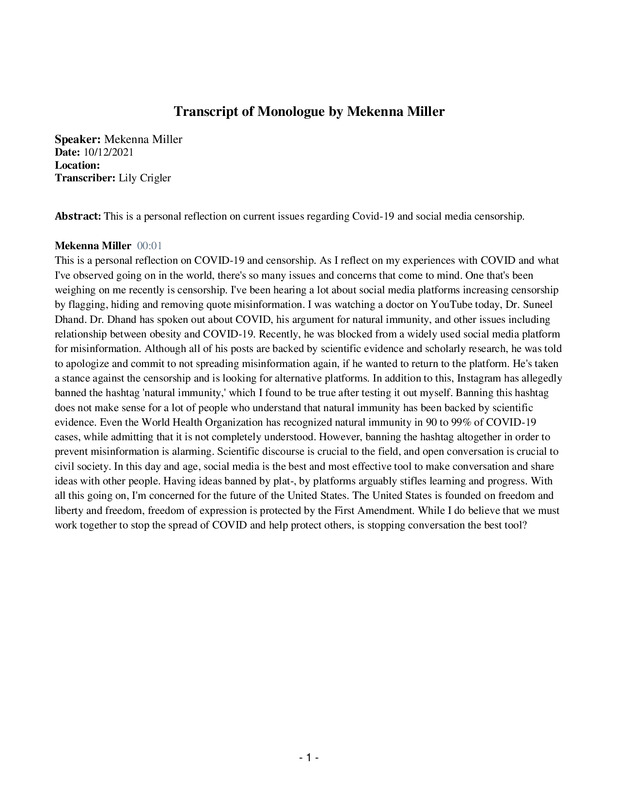 2021-10-12
2021-10-12Mekenna Miller Oral History, 2021/10/12
This is a personal reflection on current issues regarding Covid-19 and social media censorship. -
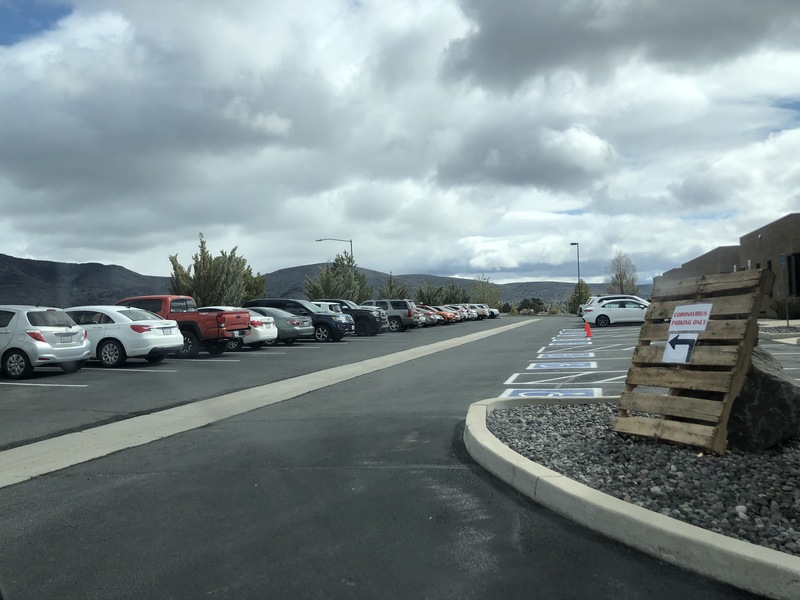 2020-03-30
2020-03-30Covid Parking
I had a friend that kept telling me that the pandemic was fake. I told her that we needed to take it serious. When I took my daughter to the local urgent care for a doctors appointment, this was the parking lot scene. I just remember being blown away at the seriousness of the situation. The urgent care separated even those that came in for covid testing from the other patients, just to keep things extra safe. -
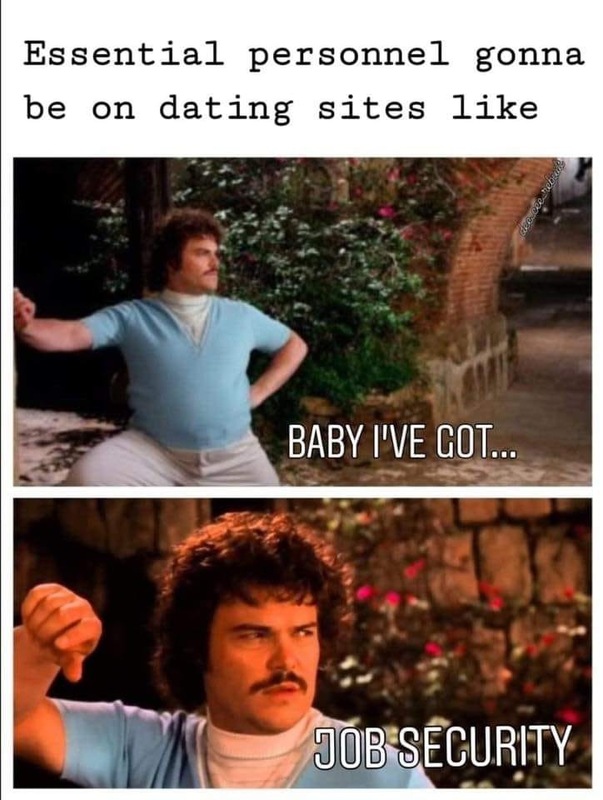 2020-03-22
2020-03-22Job Security as an Essential Worker Pride-A Meme
When the pandemic first took place, I was working as an Executive Assistant at a Domestic Violence Agency. Our agency was initially sent home, which prompted a mad dash to learn how to hold Zoom meetings, how to securely set up working from home, getting laptops and printers to workers, and all of the other craziness associated with a rush to work from home. The first day we were sent home, I spent the day learning Zoom, checking emails and answers phone calls and texts. That was a Friday. On the following Monday, I was back in the office. No one else was there, so I could do a lot work without interruption. It was determined that our work as a domestic violence agency was essential. At the time, that was a major relief for this single mom of three girls. I remember feeling panicked about the possibility of needing to go on government aid or unemployment. So, it was a total relief to me to find out we were essential. I worked hard during that time to. It took more effort and energy to help others work from home. I was glad that I could work from my work office, but it still required a lot of extra work. After things settled a bit, I would hear about how much more people on unemployment received. It was frustrating to hear about honestly. But, at the time, this meme was exactly how I felt. I felt a lot of pride to be considered essential even if it meant more work (for less pay). -
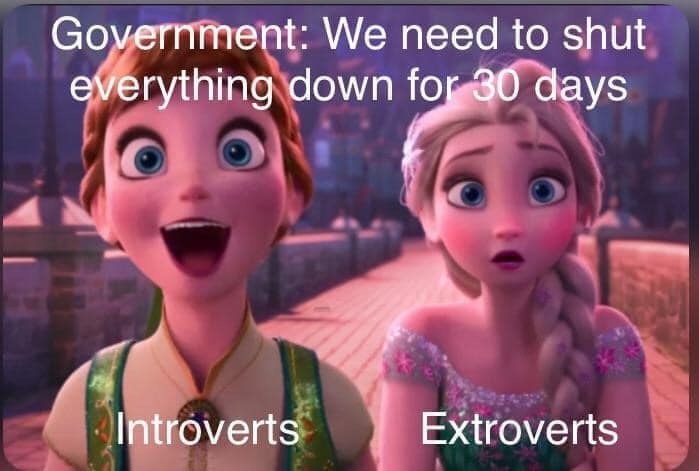 2020-03-23
2020-03-23Introverts vs. Extroverts during Lock Down-A meme
I am an extrovert. I get my energy from people. I love people. I surround myself with a lot of people. The three months leading up to the pandemic lock down I had been surrounded almost every day by almost 200 of my closest friends, people I call my family because we worked together on a theater production called Susanville Best of Broadway. When the pandemic hit, the show was cancelled and then even my work sent everyone home. I was home with my kids. And it was very quiet. We are a very active family involved in many local community projects. I have meetings every week and they have sports. All of sudden, we were home. And if I saw someone I knew while out in public (the grocery store) it was weird. I didn't know if I could hug them (I didn't) and would just awkwardly wave from a distance. It was terrible. In fact, my girls struggled and would still have friends over. I made them limit it to just one friend, but even then, we struggled. This meme really got to me. I remember hearing friends say how their life didn't change at all because they were already homebodies. The idea of being home was actually very stressful. I ended up working at my work, because being home all day to work was not very much fun. I learned a lot about myself during that time. Most importantly, I need people in my life. -
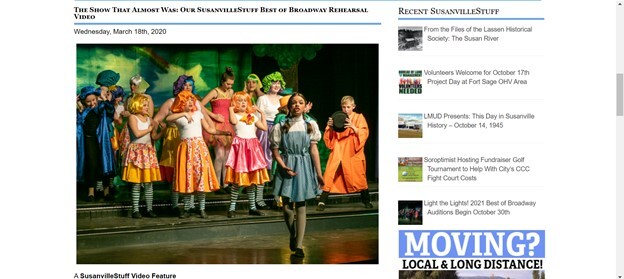 2020-03-18
2020-03-18The Show that Almost Was
After Susanville's Best of Broadway show was cancelled just a day before its opening night, Susanville's local online news editor Jeremy Couso reached out to the Best of Board members to see if he could publish an article about our show, the show that never happened. He and his wife attends the performance for a media night and he happened to have a video of the show. For a small production, the youtube video of the performance has had just under 900 views as of October 9th, 2021. I directed Wizard of Oz with a dear friend of mine, in a one year shot to direct. Watching the video of the show that didn't happen is honestly very sad and hard to do. We become family with the cast and to not reach the finale is painful. But the show must go on, and in 2022, Best of Broadway will take the stage again. -
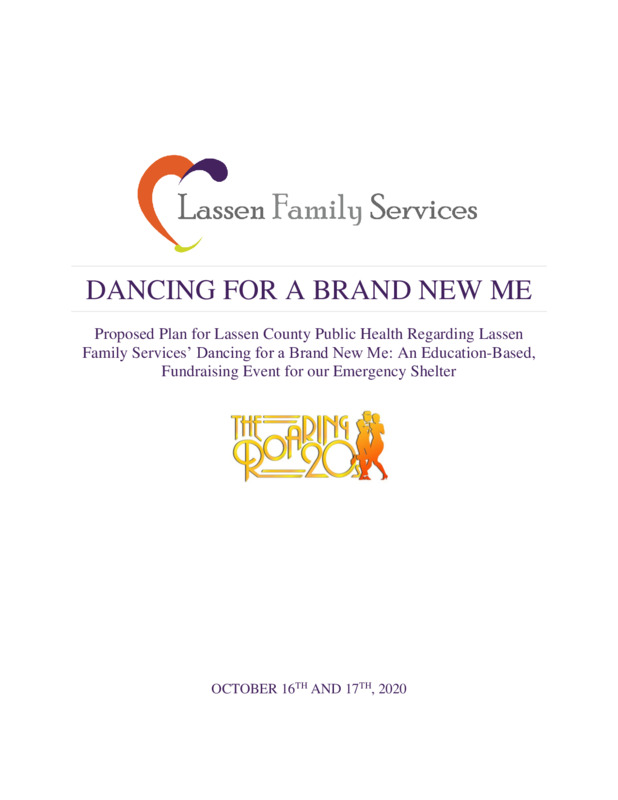 2020-10-20
2020-10-20A Public Performance in the Middle of the Pandemic
For the last few years, I have coordinated an event called, Dancing for a Brand New Me. It is a fundraiser event that is designed to not only bring about awareness to domestic violence in Lassen County, but it is a fundraiser to help pay for the the mortgage of the shelter for victims. Last year was the 7th year that local "Susanville Stars" were partnered with local professional choreographers to dance three dances before judges similar to NBC's Dancing with the Stars. Our local stars are usually very active community members who spend about 5-6 months learning the dances, but they also fundraiser to get sponsors. It becomes a fun, healthy competition to see who can out dance and out raise funds with each other. Most of the choreographers have participated in the event for many years. It has become a community favorite, selling out tickets both nights the third weekend in October. In 2020, we had to come up with four different plans on how we would perform, because of the pandemic. Our plans included only performing a livestreamed show to relocating our event outdoors. Normally, the event is performed in the local Veterans Hall that is equipped with stage, lights, and sound. In September 2020, I wrote a proposal to public health outlining in detail how we would manage the event. It took weeks for public health to get back to us. But what they approved was that our event could be held at the local High School football stadium, we had to mark off 6-foot distance, require mask, and have screenings at the gate. We had hand sanitizer stations and we were instructed two things: limited seats (200 people) and whatever we did, when we live streamed to not show the audience. The article that I attached talks more about the event than the obstacle it took to put on the event. It is incredibly difficult to move sound equipment in and out of a football stadium every day for a week. It is hard to do a staged performance when you are surrounded by a dirt track. It is hard to have your dressing room be the football locker room. It was very difficult to make all of the modifications and changes that we did. But we did it. And it was an amazing event. Even though we weren't supposed to, we have about 400 people in the audience each night. Most did not wear mask and most were sitting very close to each other. Even one of the public health officials sat in the audience not following the "rules". The event raised over $25,000! Just two weeks after our event, many of the Halloweeen events led to a Covid-19 outbreak in our community and the cases rose rapidly. Prior to Dancing for a Brand New Me 2020, we had zero cases. After Halloween 2020 our cases skyrocketed for a small town. I saw that we happened to just squeeze in one performing arts event just in time before things got bad. I feel like we were lucky and it was probably why the event was so well attended. I have the newspaper article and my proposal attached. -
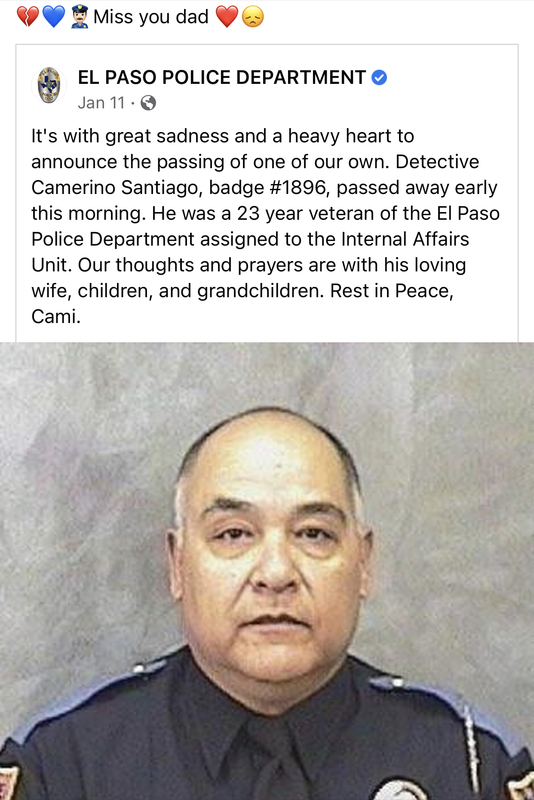 2021-01-11
2021-01-11My Dad...The first EPPD officer to die from Covid-19
After a month of battling Covid-19, my father passed away due to complications caused by the virus. He was due to retire in January 2021. He worked for the El Paso Police Department for 23.5 years. His passing hit us all hard and it was unexpected as the doctors had told us several days before that he would make it. Then he took a turn for the worst. When his co-workers asked what did he look forward to in his retirement, he said spending time with his family and his granddaughter. We still miss him to this day, especially as the holidays approach.
